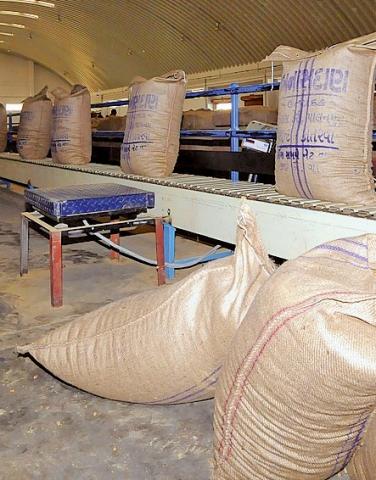2.1 Control measures
Every care must be taken in the storage of raw materials and finished products (Fig. 2.1), as one or more of the following problems may arise:
1. Infestation
2. Deterioration in quality
3. Rats and birds problem
4. Weight losses
5. Fire hazards
The storage godowns for raw materials and finished products should be separate. Raw materials are received from various sources and utilization of food grains unsuitable for human consumption is common. In such situations, infestations may occur and spread from one material to another. Cleaning, insecticide spraying and fumigations may help in checking infestation. Stacking of different materials should be done in such a way that there are minimum chances of cross infestation. Deterioration of raw materials as well as finished products may occur due to high moisture content, rancidity, mould and fungi growth etc. Immediate removal of damaged materials from the godowns may help in checking further deterioration of the remaining stock. Further the deterioration of raw materials may occur due to long storage of raw materials, especially rice polish fine, rapeseed meal, grains. Normally such materials should not be stored in godown / silos not more than a month. First In First Out (FIFO) system should be adopted.
Fig. 2.1 Finished product
The raw materials with moisture content more than 10 per cent may result in drayage loss during storage. The longer the duration of storage, more will be the moisture loss. To compensate moisture loss in filled finished product bags, extra feed should be filled in each bag depending upon season and duration of storage in the godowns.
There are a number of raw materials which are inflammable. Fire due to auto-oxidation can also take place with materials having high moisture content. A certain limit should be fixed for accepting materials containing high moisture. To prevent fire hazards, ‘no smoking’ plates etc., should be affixed and strictly adhered to. The material and godown should be insured for fire. Fire extinguishers should be kept at all strategic points and the staff should be imparted fire fighting training.
Fire hazards in raw material godown/ silos /new gunny bag go-down may also take place due to following:
• Abnormally high stacking of filled raw material (RM) bags. Height of stack should not be more than 18 bags.
• Continuous length of stacking of RM bags. Size of stacking of bags should not be more than 5 M in length and 3 M in width. There should be a minimum gap of 600 mm between two consecutive bags to ensure proper air circulation.
• Storage of raw materials in silos without aeration and re-circulation system. To avoid rise in temperature in silos, aeration system (in case of grain silo) should be operated in night instead of in day time for better cooling efficiency. In case of DORB storage silos, re-circulation shall compulsorily be done at a regular interval at least once a day.
• Improper house-keeping in sorting area of new gunny bags godown. While sorting and printing new gunny bags, waste jute particles which are fire hazardous, are deposited on the floor. The area must be protected and floor should be cleaned regularly.
In certain situations, raw materials with relatively higher moisture content are accepted with rebates. Animal nutrition officer should advise the stores officer to exhaust such materials on priority. If the sample contains very high moisture or is of inferior quality/ wet/ damaged/ infested, it should be rejected partly and inform the stores and purchaser accordingly.
Sorting of inferior/ damaged consignments
Receipt of wet/ damaged consignment of raw material is also not uncommon. Inferior material in the interior of the bags is also observed. During sampling these things should be checked.
In case, the consignment has been transported by road, the vehicle driver should be shown wet or damaged consignment and his signature obtained on the goods receipt slip and register. If part of the consignment is either inferior or deteriorated or damaged, sorting of these materials should be done in supervision of the animal nutrition officer. Inferior materials should be rejected and supplier should be informed accordingly. If the supplier fails to lift the rejected material within a stipulated period, it should be disposed off at the supplier’s cost. Sorting charges should be realized from the supplier. Lumps in de-oiled rice bran and rice polishing are quite common. Adulteration of rice polish fine with rice polish thick is also very frequent. The animal nutrition officer can immediately detect such inferior materials at the time of unloading and sampling. Depending upon the extent of damage, total or partial rejection of consignment should be decided.
Inspection of stores pertaining to quality control
The animal nutrition officer should regularly visit the stores. A careful and close examination for the presence of weevils, worms, moulds, fungal growth, rancid odour etc., is required. Evidence of damage to bags by rats and birds should be traced minutely. If there is any evidence of worms, weevils etc., immediate steps should be taken to undo the damage. The damaged material should be sorted and used or disposed immediately.

